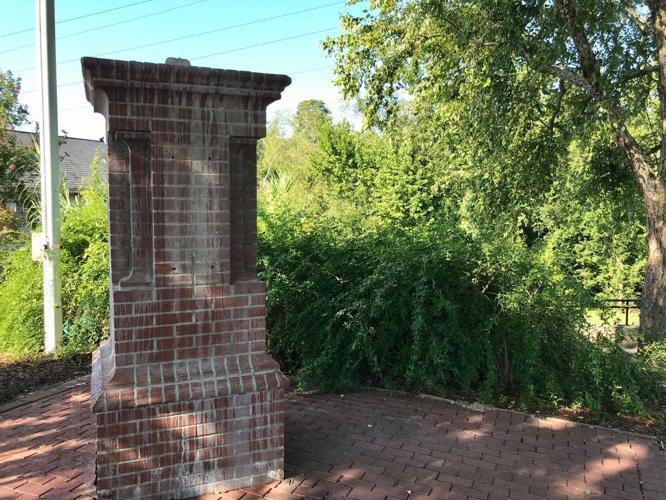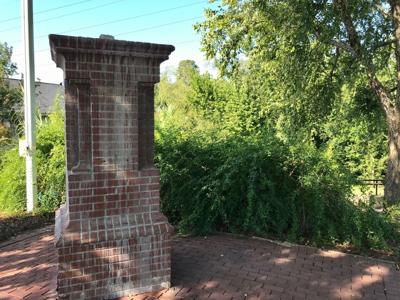On a humid morning along Columbia's Riverwalk Park last week, a jogger leaned against a 7-foot-tall brick pedestal to catch a break in the shade.
Small round holes on the sides of pedestal marked where plaques had been fastened and a concrete base on top was all that remained where a statue of explorer Christopher Columbus stood for 28 years.
All of it was removed temporarily in June by Columbia Mayor Steve Benjamin after the statue was vandalized twice with spray paint. He was concerned someone could knock over the statue of Columbus holding a cross from his outstretch arm.
"When we took it down, it came down quite easily," Benjamin said. "Someone with a pickup truck and a chain could have had his way with the statue."
Like the John C. Calhoun statue removed in Charleston in June, Benjamin does not think the Columbus statue falls under the state's law protecting historical markers tied to wars. The statue was a gift of the Daughters of the American Revolution in 1992 honoring the 500th anniversary of Columbus' reaching the Americas.
But Columbus has become a complicated figure.
He has been portrayed as a hero in classrooms for decades, an Italian explorer who lobbied several monarchies to finance his expeditions before getting help from Spain to take an arduous journey across the Atlantic. But a closer examination of what he did while in the Caribbean indicates he treated natives inhumanly — torturing, raping and killing them.
"Most people really aren't taught about Columbus, we're taught from the statue, which is never a great way to be taught," said Courtney Lewis, a member of the Cherokee Nation who teaches in the anthropology department at the University of South Carolina. "Columbus is a fairly vile human being by any stretch of the imagination."

{span}The statue of Christopher Columbus that was near the Columbia Canal along the riverwalk in Columbia. The statue was removed last month after being vandalized. Crush Rush for One Columbia/Provided {/span}
The Knights of Columbus, founded in part to demonstrate the role Catholics have played in America dating back to exploration, has denounced recent attacks on monuments. Daniel Barton, South Carolina's Knight of Columbus leader, said the city should decide the statue's fate after gathering input from the community.
Asked about the debate over Columbus' legacy, Barton said, "Public discourse is important as it allows each and every one of us the right to express their thoughts and opinions. As good citizens, we all have to do our part in framing the issue."
Questions about Columbus have been raised across the country as protests after the death of George Floyd have raised the profile of many social justice issues.
To examine the Columbus statue's future, Benjamin created a monument review committee.
The committee, which will be announced formally later this week, includes the city's public works director, a former S.C. State Museum official, leaders from Columbia's historic society and main arts organization, two Native American tribe representatives and a former head of Columbia's chapter for the Sons of Italy.
"This is a time for discussion and listening," Benjamin said. "It's a tough discussion, but one that needs to be had."

A plaque at the base of the statue of Christopher Columbus that was near the Columbia Canal along the riverwalk in Columbia. The statue and plaques were removed last month after being vandalized. Photo by Crush Rush for One Columbia
The statue could be moved to a museum or another site like the final Confederate battle flag flown at the S.C. Statehouse was sent to the Confederate Relic Room and Military Museum. Some context could be added to the Columbus statue even if it is returned to the park.
"I don't think it would be right to offend ethnic group to appease another," Chief Michelle Mitchum of the Pine Hill tribe, who will serve on the city committee.
Carmella Roche, the owner the Villa Tronco restaurant who agreed to sit in the monument committee, said she was pleased the mayor moved the statue to prevent further damage. She said she was grateful the city got the statue 28 years ago.
"There is good and bad in everything. People have different views," said Roche, who also ran the city's Italian Festival. "That was from our heritage. I hope it can be restored so we can all see it again."
Lewis noted, however, that Columbia "as a city (named after) Columbus, we absolutely should be teaching exactly who Columbus was."
Benjamin said he has been asked about the city's name. South Carolina's capital is the country's first city named after the explorer.
But Benjamin does not take issue with the city's name because the term Columbia is a reference to the personification of the new country first coined by Black 18th-century poet Phillis Wheatley in a poem honoring George Washington.
"What 'Columbia' meant to the world in those times, it was larger than Columbus. It was about democracy and it was about freedom, this new country," Benjamin said. "The name is a derivation of Columbus, but we're not named after Christopher Columbus. We're named after Columbia."
Update: Mayor Benjamin said leaders of the South Carolina State Society Daughters of the American Revolution declined an invitation to join the monument committee. Libby Billham, the group's state regent, issued a statement Monday: "The maintenance and display of the statue has been and continues to be at the exclusive discretion of the City of Columbia. We commend Mayor Benjamin’s efforts to safeguard the statue from vandalism and form a committee that will inform the City’s next steps in how it will be displayed and interpreted.”
Columbia Monument Review Committee members
• Robert Anderson, City of Columbia's Public Works Director
• Lydia Brandt, art history professor at the University of South Carolina
• Amanda Finney, representative of the Eastern Cherokee, Southern Iroquois and United Tribes of South Carolina
• Jared Glover, media relations manager at Publix Super Markets and formerly of the S.C. State Museum
• Chief Michelle Mitchum of the Pine Hill Indian Tribe, executive director of the Pine Hill Indian Community Development Initiative
• Carmella Roche, owner of Villa Tronco Restaurant and former leader of the Sons of Italy and Columbia's Italian Festival
• Lee Snelgrove, executive director for One Columbia for Arts and History
• Robin Waites, executive director for Historic Columbia














